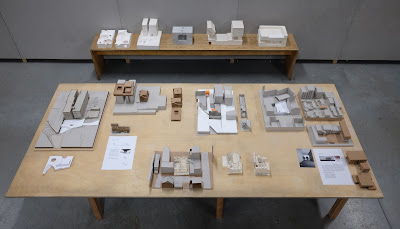Following last weeks pin-up and discussions with guest critics Harald Trapp and Michele Roelofsma about proposals for the Dalston project sites, questions emerged about how the existing qualities of the 'temporary', experimentation and flux could be maintained alongside the architectural interventions that rightly aim to create permanent anchor-points for the local community.
The lecture we gave yesterday contained some examples of graphic representations that attempt to communicate change; for example change over a timeframe, change of occupation, change of activities, change of the space itself... While your building proposals now evolve through means of two-dimensional drawings (plans & sections) we are interested to see how your thinking about opportunity for change will influence the designs. Make drawings that present evidence of this critical thinking and include notions of change alongside or within your orthographic representations of the building proposals.
Unit A
Unit A is a research-led BSc Architecture Design Studio at the University of East London, lead by Carsten Jungfer and Fernanda Palmieri. We work with live-project situations and connect design learning with research through knowledge exchange between students and external partner organisations. Unit A focuses on social-spatial conditions within contested urban contexts and understands architectural design both as a spatial and strategic response to specific socio-spatial contexts.
27/02/2018
24/02/2018
Exhibition: Place, Spaces, Work: Creative Industries in London
Interesting drawings on show this week until 3rd March by Publica in Clerkenwell. Worth checking out. Looks relevant to our discussions about alternative forms of production of space for Dalstons' creative community. More info on exhibition here.
23/02/2018
Fri 23 Feb - Structural models
09/02/2018
Open Studio 2018
Following critical analysis of Dalstons' multi-layered urban fabric, students have developed individual briefs and building programmes during last term. Currently they are working on the first architectural proposals that attempt to anchor existing activities of local organisations and community networks. Those are seen as alternative strategies of spatial production and as a response to increasing pressures on local communities caused by effects of rapid urban transformation and predominant commercial spatial production.
What became clear during the constructive debate at the Open Studios Event, is that interventions to the different project sites will require a combination of both strategic and architectural thinking. An approach that understands architecture more as an adaptive condition, a kind of hybrid. (the opposite of architecture as an idea of static entity or singular typology).
A key quality observed within Dalston derives from an understanding of space that is shared by a multiplicity of different networks and user-groups which necessitates co-existence and overlap: A kind of porous condition and testing ground enabling various forms of social, cultural and entrepreneurial experimentation. Proposals will need to make provisions to enable this phenomenon to continue.
While the permanent parts of the proposed architectural interventions will establish a new "fixed" and permanent spatial condition, the question is how projects sites can maintain critical opportunities for the informal, experimental and adaptive use at the same time?
Many thanks to all guest critics, especially Heidi Moxon and Moto Auraa Kawakami.
What became clear during the constructive debate at the Open Studios Event, is that interventions to the different project sites will require a combination of both strategic and architectural thinking. An approach that understands architecture more as an adaptive condition, a kind of hybrid. (the opposite of architecture as an idea of static entity or singular typology).
A key quality observed within Dalston derives from an understanding of space that is shared by a multiplicity of different networks and user-groups which necessitates co-existence and overlap: A kind of porous condition and testing ground enabling various forms of social, cultural and entrepreneurial experimentation. Proposals will need to make provisions to enable this phenomenon to continue.
While the permanent parts of the proposed architectural interventions will establish a new "fixed" and permanent spatial condition, the question is how projects sites can maintain critical opportunities for the informal, experimental and adaptive use at the same time?
Many thanks to all guest critics, especially Heidi Moxon and Moto Auraa Kawakami.
08/02/2018
Subscribe to:
Posts (Atom)










 Dalci
Dalci








